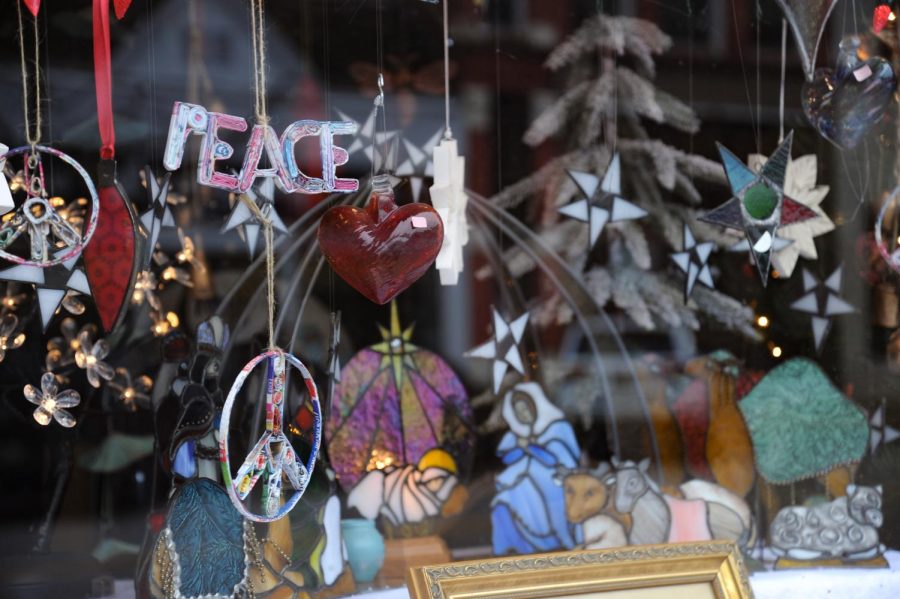Celebrate Christmas With Crafting, Not Consumerism
Small businesses in Oberlin offer a variety of Christmas gifts and decor.
Faster than anyone could have anticipated, December is upon us — and with it, the holiday season — in all its red and green-tasseled glory. The streets of Oberlin are lined with twinkling lights. A decorated tree sits in Tappan Square. Last week, Santa paid a visit to The Hotel at Oberlin and rode down Main Street in a sleigh pulled by two harnessed horses. Stores offering holiday deals abound. Even in Oberlin, a town hidden away from the prying eyes and constant advertisements of big-box stores, I have been unable to avoid the capitalist holiday spirit.
In recent years, the relevance and ease of Christmas shopping online have increased tenfold. Black Friday shopping is no longer relegated to in-person deals. Cyber Monday is no longer a means of finding Black Friday deals online, but simply an additional day for stores to offer increasingly desperate pleas for you to purchase their goods and services.
For weeks, my inbox has been inundated with deals and promotions from companies whose email lists I have no memory of signing up for. My most recent email came from a tea subscription service, promising me “50 percent off” and “an extra gold tea infuser of my choice” if I signed up for a tea subscription that day.
The holiday season has become divorced from the Hallmark movie and Nat King Cole imagery of curling up around a roaring fire, marshmallows floating leisurely in cups of hot cocoa, and snowmen. Instead, it has become a time of stress and craziness — a time when in-laws come to visit, the flu wipes its sticky fingers on every communal surface, and holiday shopping is a grueling test of strength, will, and merit won only by those most dedicated to its art.
My mother is one of the few who has mastered this craft. For my family, the holiday season is marked by her characteristic gifts: boxes wrapped neatly with old newspaper articles and tied with curls of red ribbon and gift bags ornamented with bows, bells, and delicate pinecones she has collected from hikes over the years. She gives gifts in glass jars decorated with string lights and writes the kindest letters in her curving script. She has an innate talent that makes everything she lays her hands on a labor of love.
For those like my mother, whose self-professed love language is gift giving, the holiday season can present an interesting challenge. Though the term “love language” has become gimmicky and overused — yet another phrase to enter the American vernacular through a self-help book — there is a kernel of truth in it.
There is something essential about finding and making beautiful gifts for the people you care about most. But the joy and love imbued in this process have been largely co-opted by the capitalist undertones and materialistic goals that have come to define this season. Starting as early as October, there is an onslaught of pointed advertisements from businesses trying to frame their products as necessities for life. These companies tell consumers that to buy is to show the people you love that you care.
For a broke college student, this messaging feels particularly harmful. Armed with a roomful of overpriced textbooks, empty cartons of ramen noodles, and little else, the funds to invest in expensive Christmas presents for my friends and family simply are not there. Rather than becoming another cog in the red- and green-wheeled Christmas machine, I have decided to make this holiday season one that focuses on giving meaningful, thoughtful presents that don’t cost a fortune or buy into the holiday spirit of consumerism. Oberlin, with its abundance of local shops and a student population for whom crafting seems to be a religion, is the perfect place to enact my Christmas on a budget.
Myself and a group of friends, all attending college across the country, all eating the same ramen out of the same Styrofoam cups, have pledged ourselves to this effort. Upon looking at our sinking bank account numbers and recognizing the contrived nature of the Christmas consumerism around us, we have decided to participate in a $1 Secret Santa. This functions like the traditional Secret Santa, with one major adjustment: no one is allowed to spend more than a dollar on their present. This holiday, join me as I craft and barter and borrow and bake in hopes of redefining the reason for the season as something more than clicking “Add to cart.”








